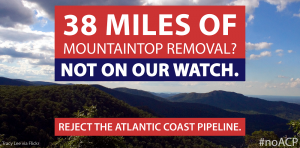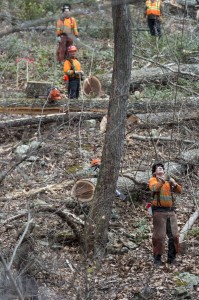From an Article by Maya Weber, S&P Global Platts News Service, 1/18/19
Washington — The Trump administration is seeking to pull back and rethink the US National Park Service permit for the Atlantic Coast Pipeline, in further fallout from adverse US Court of Appeals for the 4th Circuit rulings for the project.
The action is another sign of how litigation over permits is complicating the path forward for the 1.5 Bcf/d, 600-mile project, meant to move Appalachian gas to Mid-Atlantic markets. Construction is on hold, at least until March, while the court reviews separate Fish and Wildlife Service authorizations.
The NPS permit involves authorization for the pipeline to pass under the Blue Ridge Parkway. After the 4th Circuit vacated the initial permit in August, finding NPS failed to explain how the right-of-way did not conflict with the purpose of the scenic parkway, the agency reissued the permit in September.
In an unopposed motion Thursday in litigation challenging the new permit, the Department of Justice asked to have the NPS permit voluntarily remanded to the agency. Among other things, environmental groups challenging the permit argue justification is lacking for a categorical exclusion to the National Environmental Policy Act (NEPA) that NPS used to support the decision.
“On remand, the Park Service will vacate the permits and further consider whether issuance of a right-of-way permit for the pipeline to cross an adjacent segment of the parkway is appropriate,” the DOJ filing said. “That reconsideration will include discussions with other land management agencies within the Department of the Interior and the Department of Agriculture regarding the government’s authority to issue a pipeline permit across the adjacent George Washington National Forest land and, if such authority exists, the appropriate agency or agencies to evaluate [Atlantic Coast Pipeline's] application for a crossing of that land and the parkway land.”
DOJ also noted that the permit rested in part on the US Forest Service right-of-way, which has since been struck by the court, to cross 680 feet of the George Washington National Forest.
And in light of petitioners’ arguments about NEPA and National Historic Preservation Act (NHPA) it said it needs to rethink its findings about the impact of the NPS right-of-way on environmental and cultural resources of the parkway.
Groups Cite Lack of Environmental Impact Statement
Environmental groups had argued in their opening brief (Sierra Club v. Department of Interior, 18-2095) that NPS failed to take a hard look at environmental impacts when it issued the new permit and granted a categorical exclusion from NEPA for the project’s parkway crossing and failed to adopt the Federal Energy Regulatory Commission’s environmental impact statement or conduct its own EIS.
They noted that the categorical exclusion that NPS cited was for installation of underground utilities in previously disturbed areas having stable soils, or in an existing utility right-of-way. “No document in the record justifying the [categorical exclusion] identifies this right-of-way as a ‘previously disturbed area’ or ‘existing utility right-of-way,’” argued the brief filed by the Southern Environmental Law Center.
The groups also argued that in violation of the NHPA, NPS failed to evaluate the impacts on the viewshed of the scenic parkway and skipped mandatory public involvement.
Actions from the USFS, NPS, Bureau of Land Management, FWS and US Army Corps of Engineers have stumbled in the 4th Circuit, which has stayed or vacated a variety of permits for Atlantic Coast Pipeline or the Mountain Valley Pipeline.
The Southern Environmental Law Center (SELC) maintains the hurdles reflect rushed agency decisions, and that the National Park Service (NPS) action stands out for its suddenness.
Project backers consented to the request for voluntary remand. “Per their filing, NPS has not confessed error but intends to fully evaluate the petitioners’ claims to determine if any adjustments need to be made to the permit,” said Karl Neddenien, a spokesman for Dominion Energy. “If the court grants the motion, we are confident that the NPS will promptly reconsider the facts and reissue the permit.”


